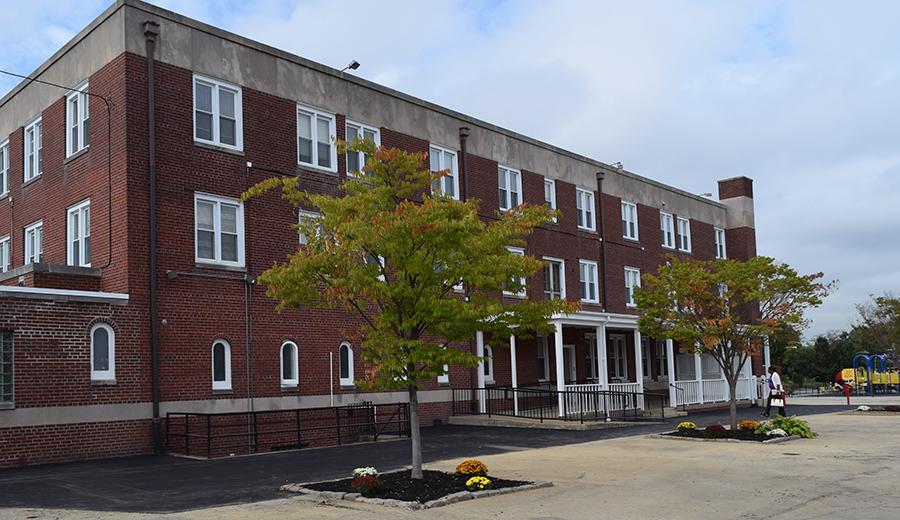Advocates are embracing a new first step to help the homeless: permanent housing
A recently opened housing development in Philadelphia, Pennsylvania for chronically ill homeless men and women.
Becky Kanis Margiotta was trying to help the homeless in Times Square, working for Breaking Ground. She was surrounded by dozens of other organizations within just a few blocks, all trying to solve the same problem.
“Our original theory was, ‘Could you knit [those organizations] together and have that result in a quantifiable reduction in homelessness?’ And quickly we learned that the answer was ‘no.’”
The shelters and treatment programs were all temporary solutions. “The Band-Aid became the solution and the Band-Aid doesn’t in any way solve the problem,” Margiotta says.
Then she stumbled on a game-changing idea: Instead of shuffling people into temporary shelters and drug treatment programs as they’d been doing, they could put them in permanent housing first and then start dealing with addiction and mental health issues.
This idea is known as Housing First. And it’s been spreading. Margiotta led a successful four-year campaign to house 100,000 homeless people across the country. It ended just last year. A follow-up campaign, Zero: 2016, is running now.
Studies show that offering Housing First policies can actually save taxpayers' money. Researcher Dennis Culhane completed an influential study of the cost of services for homeless with mental illness in New York in 2002. What he found was that services for the homeless quickly add up. Take shelters, for example.
“For many people, they think, ‘Wow, just open up this place, throw in these beds. It should be pretty cheap,’” Culhane says. “In fact, running a facility, and all the costs associated with facilities and meals and laundry and staff and security, it actually is much more expensive than you’d think. And per bed it’s actually much more expensive than a conventional apartment.”
Hospital visits are pricey too.
“Many of the conditions for which a homeless person is in the ER, they can’t self-care and they end up getting admitted to the hospital when they might not need to,” Culhane explains. “Once they’re in the hospital, they end up staying longer than the usual patients, because they don’t have a place to be discharged to.”
When you add it all up, Culhane says chronic homelessness costs around $20,000 per person per year. And the elderly, or those with mental health issues, cost even more.
According to his research, it costs less to house someone permanently — closer to $12,000 to $14,000 per slot.
The problem is, just because a solution is cheaper, doesn’t mean you can actually make it happen.
“The resources and dollars are siloed politically,” Culhane says. “And you can’t take money that could be saved in healthcare and move it over and pay for housing. So there are frustrating obstacles that exist in the whole political process and they exist for a reason, but which I think are frustrating.”
There are critics of Housing First policies. They say it’s a one-size-fits-all solution that doesn’t work for everybody. And by not requiring drug addiction or mental health treatment first, before providing permanent housing, it enables those issues to persist.
But Margiotta says providing housing and treatment for addiction or mental health are two different issues. “Detangling behavioral health issues from whether or not someone should be in a home I think is an important step to take as a society and realizing that is a health issue, a public health issue. And putting someone on the streets doesn’t do anything at all to help that person with that health issue.”
For Margiotta, Housing First delivers on a promise she says we’ve already made.
“[Providing housing] is something we as a society have already agreed is a good thing. That worse comes to worse, we definitely don’t want people to not have a home.”
This story first aired as an interview on PRI's Innovation Hub. Subscribe to the Innovation Hub podcast.
Our coverage reaches millions each week, but only a small fraction of listeners contribute to sustain our program. We still need 224 more people to donate $100 or $10/monthly to unlock our $67,000 match. Will you help us get there today?
